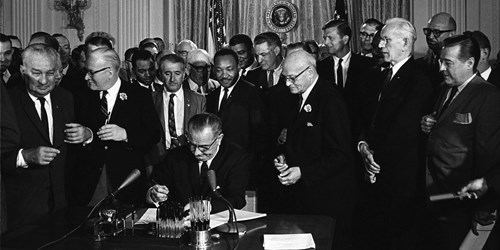
Dr. Martin Luther King, Jr. once said, "We must face the sad fact that at eleven o’clock on Sunday morning … we stand in the most segregated hour of America.”
Fifty years later, research suggests there is still a gap between the diversity in America’s cities and the diversity in our nation’s churches.
Working Toward the Dream
Dr. King tirelessly worked to end racial discrimination in America, wanting freedom for everyone, regardless of skin color or background. He dreamed of the day when all people would stand on level ground because unity and justice are the strongest realities, not bigotry and inequality.
Unity is not a great dream because it was Dr. King’s dream. It is a great dream because it is God’s dream. Dr. King vocalized something that has always been in God’s heart.
If God’s Grace Is Really for Everyone
If we really believe the Gospel — the story that we’re dead in sin but saved by Jesus through His sacrifice on the cross — is the best message in the world we have no excuse to withhold from others the same grace God demonstrated toward us.
When we judge others for being different, two things happen: we lower our standards from what God wants to what we want, and we shape our churches around what we think is best instead of what God has told us is best (Ephesians 4:4-6). Where people draw distinctions and differences, Jesus draws us together. God always invites us to be a part of something bigger than ourselves. The promises we share in Christ are far stronger than the positions or possessions we have on our own (James 2:1-9).
Division doesn’t belong in Jesus’ Church; diversity does.
A Message of Division Is Not a Message of Jesus
Division in churches needs to end, not just in regard to race, but also in regard to people from different faith backgrounds, socioeconomic classes, countries, or backgrounds. Jesus didn’t start the Church to exclude certain types of people, but to include all kinds of people.
Division doesn’t belong in Jesus’ church. Diversity does. Diversity makes the church stronger. With a variety of different perspectives, backgrounds, and expressions of faith in Jesus, we’ll be better prepared to celebrate Him together in eternity.
In the Bible, God gives us a sneak peek of heaven: countless multitudes from every nation, tribe, and language (Revelation 7:9). If any of us aren’t willing to embrace as brothers and sisters people who are different than us, we simply aren’t aligned with what God values.
The more we join together in reaching people in our neighborhoods and cities and the world, the more united and effective we’ll be in connecting people to Jesus and each other (Matthew 28:19-20).
Sunday mornings may still be the most segregated hours in America, but it doesn’t have to stay that way. It can be different.